RECOMMENDATIONS
More recommendations
-
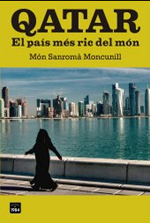
Qatar: el país més ric del món
Sanromà Moncunill, Món. Qatar: el país més ric del món. Barcelona: Edicions de 1984, 2013.
In current geopolitics, Qatar is both the great unknown and the most important player of all those that have emerged in recent years. With an intelligent and subtle diplomacy which makes use of the smooth power of money and the appeal of communication, it is probably the state whose influence is the most disproportionate in the world in view of the size of its population.
The book discusses these questions and many others, with brushstrokes of sociological analyses on the lives of people in the Arab emirate to the living conditions of the immigrant workforce, which can be quite similar to a sophisticated system of modern slavery.
Written in a fresh, yet polished style, as any piece of good journalistic work should be, it makes use of the necessary information at all times. However, the picture he paints of the situation is a disturbing one. In between the lines, this piece appears to warn of the - often difficult to balance - compromises being made in international politics between democracy, economic growth and respect for human rights. Somehow, the author challenges us, prompting us to question things we might not have considered before. In other words: are we prepared to follow the example of Qatar?
X.A.
-
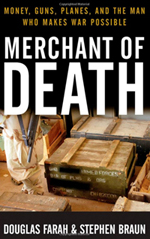
Merchant of Death
Farah, Douglas; Braun, Stephan. Merchant of Death: Money, Guns, Planes, and the Man Who Makes War Possible. New Jersey: Wiley, 2008.
Viktor Bout. The merchant of death. A phrase which made ??a fortune in the press. And in the United Nations. And in different areas of international diplomacy. The man who, with a fleet of aircraft bigger than that of several NATO countries, would violate embargoes and sell weapons to both sides in dozens of armed conflicts. Especially in Africa. Protected by the Russian government, even the U.S. government is rumoured to have made use of his services. And while NGOs called for an international campaign for a global arms trade treaty, the most famous arms dealer in the movie world (think about, for example, The Lord of War), carried on cultivating friendships with African dictators and accumulating a huge personal fortune.
From the end of the Cold War to the present day, through the Balkan wars, African genocides, 9/11 and the wars in Afghanistan and Iraq, his footprints are everywhere. The authors note that he was fortunate enough to intervene at a time when transnational threats were yet to be considered important enough by intelligence services, excessively attached to the realism of international relations which only considers actual States as stakeholders worthy of attention.
This book, written by two American journalists, experts in the field and with a prestigious curriculum, delves into available information to deliver a portrait which is quite faithful to reality: that of a terrifying figure, probably the best in its field and occupation. Death.
X.A.
-
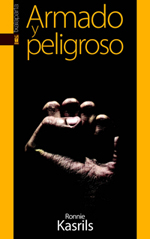
Armado y peligroso
Kasrils, Ronnie. Armado y peligroso. Txalaparta, 2012.
This book is essential to understanding much of the struggle against apartheid and largely complements Nelson Mandela's already classic 'Long Road to Freedom' and 'Conversations with myself'. For we must not forget that this struggle took place on many fronts at the same time. There were mass actions of resistance and non-violent civil disobedience, there were international boycott actions in many areas... but there were also actions involving armed struggle. In his work, Ronnie Kasrils explains the reasons that led him to participate in sabotage activities and to dedicate much of his life training activists who would later be involved in countless armed operations. This is an honest yet, and how could it possibly be otherwise, biased book. On one hand, the crimes of apartheid are described in all their harshness. On the other hand, even though there is some self-criticism present, perhaps there should be more. After the South African Peace Process, the author held various executive positions in the government before eventually devoting himself to what appears to be his true calling: conflict mediation and transformation. It is worth noting that like many South African anti-apartheid activists, he has distinguished itself in recent years for publicly criticising Israeli policies in this regard, as a staunch supporter of the boycott, divestment and sanctions campaign.
X. A.
-
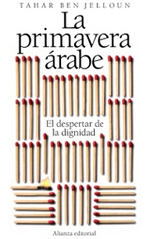
La primavera árabe: el despertar de la dignidad
Ben Jelloun, Tahar. La primavera árabe: el despertar de la dignidad. Madrid: Alianza, 2011.
Moroccan writer Tahar Ben Jelloun, who was awarded the Peace Prize by the Association of the United Nations in Spain (2006), has once again proven his skill as an essayist by bringing us a novel perspective on the Arab Spring: the uprisings which have been revolutionising the Middle East and North Africa since late 2010.
With The Arab spring: the awakening of dignity, Ben Jelloun slips into the minds of each one of the Arab dictators who had to respond to the wave of peaceful protests calling for greater democracy, increased population rights and economic improvements.
Writing ina light, yet critical and sometimes ironic tone, the Moroccan author reveals who Ben Ali is rumoured to have blamed for the protests before going into exile in Saudi Arabia, or what Mubarak's thoughts may have been during the serious clashes that caused 846 deaths in the country he had ruled for 30 years.
Without forgetting his native Morocco, or the role that European countries played in the consolidation of some of these dictators -let's for instance remember the pictures of Aznar, Zapatero, Sarkozy or Berlusconi with Libyan dictator Gaddafi - Ben Jelloun presents a straightforward account which allows everyone to understand that "there comes a point where a humiliated man will no longer live on his knees and demands freedom and dignity, at the risk of losing his own life."
M.S.
-
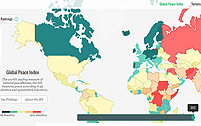
Global Peace Index 2013
http://www.visionofhumanity.org/#/page/indexes/global-peace-index
The Institute for Economics and Peace recently published the seventh edition of the Global Peace Index, an indicator which measures each nation's peacefulness. This index takes into account 22 factors, ranging from the level of military expenditure to relations with neighbouring countries and the percentage of incarcerated population
Results show that the world is 5% less peaceful than it was seven years ago, when this index was first calculated, due to a sharp rise in the number of homicides. Europe is the most peaceful region, since it is home to 13 of the 20 countries with the best score, including Iceland, which is at the top of the list, and Denmark, which ranks second.
The three least peaceful countries in the world are Afghanistan, which has been at war since the U.S. invasion, followed by Somalia in the second position, and third, Syria, which has dropped 87 positions in the last 7 years. Libya, still recovering from the Gaddafi era, is the country whose results have improved the most compared to last year.
The Spanish State ranked 27th out of 162 countries, behind Taiwan (26th) and Poland (25th). Spain is a little less peaceful now than it was in 2012, mainly due to the increase in the number of protests in which outbreaks of violence have been reported.
The Global Peace Index is a helpful tool which we would recommend using in reports and research. In fact, it is routinely used by governments and international organisations like the United Nations, the World Bank and NGOs.
M. S.